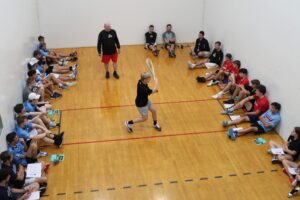
This question came to me through the chat room on a rare appearance for me on USA Racquetball Live Streaming in the men’s finals of the USA Racquetball Doubles and singles qualifying tournament in Feb 2020.
Forgive me because I am paraphrasing but it went something like this-“How much time do you recommend on court vs off court preparation?”
One of my first influences in the 70s was a book by a track coach who used a pie chart to divide the athlete into categories such as strength, footwork, skill, and endurance. I added a few more such as rhythm of movement, nutrition, mental preparation and flexibility.
So a strong athlete does not need as much time in the weight room as the weaker athlete. What usually happens is human nature. The stronger athlete wants to do what they like best, strength train off-court. The skilled athlete likes to be on the court. Mental preparation may be over-looked as well. And a huge part of preparation for matches would be proper nutrition.
Now a general rule of thumb-if you are in the weight room for more than 45 minutes a day, and you play racquetball, you are doing too much off court work. (Keep in mind the above paragraph as maybe, if I have a weaker athlete, that athlete needs to spend more time than 45 minutes. Other exceptions could be rehabbing injuries and off season training. Pro athletes who play for a living could be an exception also but not by much more than the 45 minute rule. On court skills win more than cross fit skills.
Each athlete has different schedules, and demands on their time. The schedule has to be based on their personal daily schedule.
Coaching top level professionals has led me to one conclusion. If you can serve well and hit winning shots more than the opponent, you will win. (I know-genius-right?”) If you are stronger, faster, and are having a good hair day, maybe not! It comes down to skill and execution.
So if you have a question regarding where you should be; off or on court-the answer is practicing your craft on court. Prepare off court to supplement your on-court work; not vice versa.
